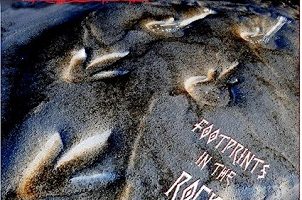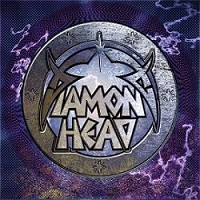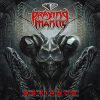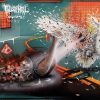Diamond Head – Ride the Coffin Train
Sunday, 23rd June 2019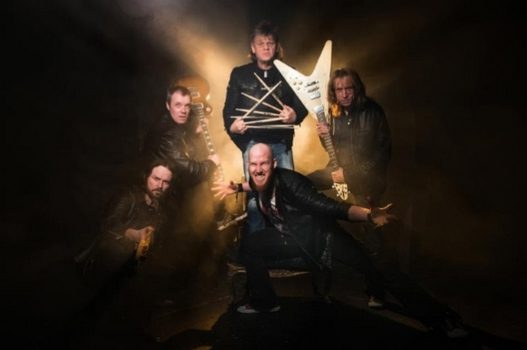
When it comes to the conversation over influential bands from the late 70’s/early 80’s British metal scene (aka the New Wave), it’s obvious that Diamond Head should be a part of the essential conversation. Especially considering the numerous cover songs that Metallica recorded which vaulted the band to an international audience during the 1980’s. They are still alive today, recording new studio albums that provide robust riffs and sterling melodies for those into straightforward, blues-based heavy metal.
On a high from their first gig in seven months to support the new record The Coffin Train in London, guitarist Brian Tatler called to discuss the ideas and development of said record, thoughts on how Metallica helped the band develop a forty-plus year career, and favorite memories/gigs related to Diamond Head. And if you’ve been neglectful in not checking out their recent studio albums- be sure to catch up, as these veterans prove that they still have vital music to execute and deliver to the public.
Dead Rhetoric: The Coffin Train is the latest Diamond Head album – and it’s receiving great press and accolades globally. Tell us about the songwriting and recording sessions for this outing – and what you wanted to get across and accomplish this time around compared to previous records?
Brian Tatler: It always starts the same for me, and with Diamond Head – you try to come up with guitar riffs, everything starts with a riff. I build on it, I do a demo at home, I have a Pro Tools rig so I use that. This time around, I would go to down to Rasmus’ studio – once I’ve got enough material and enough ideas there, as I always write more than I need, I would go to his home studio in London and we would work on the songs again. He plays guitar as well, between us we would re-write the songs a bit and make more demos. Once you’ve done that process, then it would go to the band – organize rehearsals and start playing the songs in a room together to see how they felt, change and do all that to get comfortable with (the songs) before we went into the studio.
That’s the process. It’s sort of what we did last time, but on the last album we recorded the drums in a small studio. We recorded it all in the same studio, which was not a big room, heavily carpeted room. We thought the drum sound was a little bit lifeless, so we wanted a better drum sound this time. We went to a studio in Birmingham that had a bigger, live room and recorded the drums there. Then we went back to the smaller studio and recorded the rest of the album there. The other thing we did differently, this time Ras was the producer, and also mixed the album. Last time the band produced it, and this time Ras wanted to be the producer- he’s into that. It’s obviously something he’s good at, he’s into technology and looking on Ebay for microphones and things like that. He’s done a fantastic job, he spent quite a while mixing it at home. I think it sounds really great.
Dead Rhetoric: With vocalist Rasmus Andersen, can you discuss his range and versatility, do you believe he’s been well-accepted now as the Diamond Head vocalist from the old and newer followers of the band?
Tatler: I do. He’s been in the band five years now and he’s made two albums with us. All I ever get is huge compliments on his behalf, what a great singer he is, what a great frontman, and what a great writer. What an amazing range he’s got, a powerful range. Over the five years I’ve discovered more and more about how talented he is. I’d never met him before he joined Diamond Head, I thought he had a great voice and he would be fine for doing the old material, because we had a tour coming up. I wasn’t thinking about new material- as I spent more and more time with him, he could write, play guitar and piano, he’s a producer, he can mix – he’s a very talented guy. I found bit by bit about all of that.
It’s lovely to have that kind of range available for the band. He’s very good at his warmups, he knows how to look after his voice. We’ve done thirteen nights in a row sometimes and his voice seems to be able to hold up. He’s got a very strong voice. I can fire any kind of riff at him and he doesn’t bat an eye about it. He’ll be able to sing over the top of it and be able to find some kind of melody. That frees me up to be even more creative and come up with anything that we want to try instead of being restrictive. It’s very good at the moment, the band is in a good place.
Dead Rhetoric: Do you find over the years you need to specific times of the day or circumstances for your best ideas to develop creatively? Or does the process change album to album?
Tatler: I like to be fresh I think if anything. I probably work best after a good night’s sleep. I’ve never really worked well under pressure. You know how bands used to write an album in a week, and they would come off tour and have to go straight into the studio. The Beatles, The Rolling Stones, the bigger bands had to do this – they had to have a new hit single like every six weeks. I don’t know what’s it like to be in that kind of position, under pressure. I can take my time, work on an idea for a year if I want to, bit by bit, come back to it and change things up. I have the luxury of being able to tweak things.
Dead Rhetoric: Were there particular songs on this album that were easier to develop, or ones that took a little more time?
Tatler: The last song we wrote for the album was “Belly of the Beast”, which is the fast opener. That one came together quite quickly – we put that together in only a couple of weeks. “The Sleeper” took a little bit of time, Ras did the orchestration on that and spent a little time mixing it. “Death by Design” was something I had at home as a demo, it just sounded good and we ran with that one. “Until We Burn” the last track I’ve had as an idea since 2006- it never got finished. I tried to get it on What’s in Your Head? and the last album, it didn’t quite work. I put ideas like that to the backburner – usually I’ll believe in the song, but if it doesn’t work or the vocals, I let it go and come back to it. That one had a bit of rework, I’ve probably demoed it five times in different keys and tempos. It’s quite a bit of work in preparing this album- I started working on demos in 2016, and it comes out in May of 2019. Maybe two and a half years in between festivals and tours that we’ve been working on this.
Dead Rhetoric: Now that you have professional management behind the band for the first time in your career, do you believe you are able to take a burden off of the business side of things and concentrate more on the music and things that you derive pleasure from for Diamond Head?
Tatler: It’s a good point. I hadn’t discussed that with anyone. I always think that good management will always filter out the good from the bad, we won’t end up playing to a little audience in a pub somewhere because we’ve done that over and over again in my career. Management should lift the band’s profile and be able to open doors previously shut to us. Already as an example, we are playing a huge festival in France that we’ve never been able to get before called Hellfest. We’ve got Wacken, we last played Wacken in 2003 and they just wouldn’t have the band back. Now that we are with Siren Management, suddenly we have Wacken. We have Silver Lining, we are aligned with Black Star Riders, Saxon, and Uriah Heep – it’s a good roster of bands for Diamond Head.
I think they will help us move up the ladder. All I want for the band is for things to improve. The live work, we don’t want to be going down the same road that we’ve been going down for years, club and pub tours. We are doing a lot more festivals this year, we’ve got some support shows with Saxon and announced a tour with Black Star Riders. I think that’s the way forward for Diamond Head, move it up the ladder. There’s a tried and trusted route to move up the ladder. You need management and some power.
Dead Rhetoric: How critical and conscious are you of what Diamond Head develops now that doesn’t tarnish the legacy that you’ve established with your early material?
Tatler: I’ll accept things as they come. We’ve done well to survive since the band started in the 1970’s. It’s hard to keep a band happy, a lineup where everyone is enjoying it. I just want to keep it rolling forward as long as we can. Music-wise I think there are still connections with the early material. When we are writing we are fully aware of the Diamond Head legacy, certain songs like “Am I Evil” are a big part of the Diamond Head history. It would be lovely to write another “Am I Evil”, we would like to write something even better, or hopefully as good. I try not to become too far away from the style, we’ve done that on the last album and this album and it’s really worked. It’s not that we are too obtuse or challenging or take us in a different direction. It makes sense to do a certain type of sound. This album is better produced than the last one – but you can still tell it is Diamond Head. I hope there is a line that runs from the first album all the way to The Coffin Train.
Dead Rhetoric: Can you think back to a special moment or two when you knew what Metallica was able to do to resurrect the career of Diamond Head – because a lot of times, bands may not necessarily get a second or third chance at establishing a music career, but you were able to through their covers of your classic songs?
Tatler: That’s true. I remember when it got really huge around 1991 when the black album was selling huge numbers – and the band were consistently name checking Diamond Head in the press. Diamond Head had stopped functioning in 1995, it was suggested that we get back together and it seemed daft not to. Sean had got a deal, and he was working with another artist on an album – Sean and Robin George. The guy who got them the deal suggested that it would be a good idea to get Sean back together with me and do a Diamond Head album. Metallica and the name checking, we were a very influential band, that was one of the main reasons why we started making the album that became Death and Progress. It got the ball back rolling, and made us want to carry on and keep doing it, continue to play live.
Dead Rhetoric: Where do you see the major differences in the global metal scene today compared to your early development in the 70’s and 80’s?
Tatler: (laughs). I’m shocked that it’s become so huge. I had no idea that back in the 1970’s when it was called heavy rock or progressive rock, no one had even termed it heavy metal in the mid-70’s. Worldwide festivals, the magazines, the websites- it’s a huge industry, it’s a lifestyle. It’s one of the biggest selling music genres on the planet. I always felt that this was a bit more out of fashion, underground – there have always been huge mainstream bands like The Eagles, Queen, and then heavy metal seemed a little bit more on the edges. Thanks to bands like Metallica, it’s moved a bit more towards the center, selling millions of millions of records and becoming a large draw live. Bands have benefited from the work of Metallica and Iron Maiden. Everybody wants to be the next Metallica, that’s a coveted goal.
Dead Rhetoric: What have been some of the favorite moments in the career of Diamond Head – either specific songs, album recording sessions, or live tour/festival appearances that will stay forever embedded in your memory banks?
Tatler: I always have immense satisfaction from finishing an album and getting it in my hands. Once I’ve got it in my hands, it’s out and it’s released. It can no longer be fiddled with or changed in any way. You can spend a couple of years working on an album, adjusting and tweaking, and when it comes out – you no longer are able to do that, it’s out into the world and people can finally listen to your work and enjoy it hopefully. A job well done, and it’s completed. They are like your babies, aren’t they – the albums?
The other thing is live – certain gigs are just special. It all comes together- the sound, the crowd, the moment. So certain gigs have stayed in my mind. I remember the Reading Festival in 1982, and we did a couple of shows in the US that were great. We did Heavy MTL in Canada in 2011, and that was a really great gig. We did one in Spain a couple of years ago, that was a fantastic gig. Certain gigs just work and you can’t wait to do them again. Sweden Rock is another brilliant festival.
Dead Rhetoric: Do younger musicians (or fellow musicians) ever seek you out for specific advice regarding music or business-related questions – and if so, what items do you express to them to maybe ponder or take seriously?
Tatler: Yes, they do. They want to know about management, publishing, maybe getting a record deal. What amps and guitars I use, equipment. Do I know any good singers? Sometimes I get that. I always say that one of the most important things that any band can do is write songs. That’s the life’s blood of the industry- the commodity, they will make money long after you are in your grave. If you get that right, they will stand the test of time. Some of the Diamond Head songs are now forty years old, we are still playing them live and still going down well. We still play “Am I Evil” and “It’s Electric”- and that one is from 1978, that song is 41 years old and I wrote it in my bedroom, quite quickly. We are still playing it and it’s a treat.
Dead Rhetoric: What’s on your bucket list to accomplish either personally or professionally at this point in life?
Tatler: I’d like to keep the band going and play some bigger places, moving up the ladder a little bit. We’ve done so many club gigs and pub shows- played to 50 people in Poughkeepsie and Grand Rapids. It would be nice to be at a level where you are playing to 400-500 people a night. I would like to go to certain countries that we’ve never been to- Australia, New Zealand, we’ve never been to South America. There are still places in Europe that we haven’t been – we’ve just been offered a gig in Romania, and even some places like Switzerland, I’ve only played once or maybe twice in my career. That’s always exciting to go to new places and whip up the crowd.
Dead Rhetoric: How has your love and admiration for hard rock/metal evolved from your youth to current times?
Tatler: I’m still a huge fan of rock and metal. I’ve been a fan since I was about 12 or 13. I’ve got an older brother David who is six years older than me, he would bring home albums from Led Zeppelin, Black Sabbath, and all sorts. That is where my love of it came from. He took me to see Sabbath when I was 14. It’s still there now, I have a collection of albums and CD’s. I still listen to music for pleasure- I’m still a bit of a 70’s guy and that my favorite bands came out of the 70’s. It was a great time for music for me, so many awesome bands. I do look out for new bands on Spotify and YouTube. I see support bands that I like, but a lot of your tastes are formed when you are a teenager. It’s hard to maybe get away from that.
Dead Rhetoric: Did you know it was a special time when the New Wave of British Heavy Metal scene developed, with all of these bands, pubs, and interest in your country? Did it develop out of a blue-collar work ethic and the need to express oneself creatively?
Tatler: I think so. We just had all these brilliant bands in the 70’s – punk rock had happened big time in 1977. It was all over the press, the news, the television. That was very do it yourself. All the bands around the country, we didn’t want to be punk rock bands, but emulate our heroes like Led Zeppelin and Deep Purple. We formed bands, but we didn’t have a clue how to make it. You just did it anyway because you loved the music. You want to experience being on stage, and playing in a band and the audience reaction. That’s how Diamond Head started, for the fun and for the love of it. And then when the New Wave of British Heavy Metal happened, it was great to develop some press and then maybe gain a record deal. This impossible dream of getting signed and becoming a big band. It always seemed to me that there were always big bands and little bands – I didn’t realize there could be a middle ground.
Diamond Head has never been a big band like AC/DC. But we are at a level where we can tour around the world and make records, we aren’t millionaires but there is this middle ground where we are professional musicians who can operate and make a living without being at the top or bottom. I had no idea I would have a forty-year career doing that.
Dead Rhetoric: How is the next year shaping up for Diamond Head in terms of touring activities and support for this album?
Tatler: Really good. We have a load of festivals coming up through Europe and England, and then we have dates with Saxon and Black Star Riders. We are hoping to get to the US in the new year, and possibly Japan. All sorts of offers are coming in now. Now is a good time to book Diamond Head. It’s all sort of lined up, the stars are lining up for us.















